by WiseOcean | Jan 13, 2022 | Scale Up
This is a write-up from Scale Up Talk – Keys of Growing Deep Tech Startups, hosted by WiseOcean.Tech on 10/28/2021.
Self-Introductions
Mikko Kumpulainen, Voima Ventures
Tuomo Virkkunen, Boardio
Hani Elshahawi, NoviDigiTech (with the introduction of Shell GameChanger program)
Q&A from the Roundtable
Jessie: How do you evaluate the IP or core technology of deep tech startups in diversified fields?
Mikko:
When a deal flow comes into our hands, we pick which partner from our team is going to take a look at that case – some are familiar with Med Tech, some are experienced in process innovations, there are different expertise in our team.
We also use third-party IP consultants to do assessments. Then, of course, we have very good connections to VTT, the technical research center of Finland, with research experts. We can give them a call and have a chat about the technical challenges. And we also are building a technical advisory board where we are planning to have key opinion leaders, professors from different universities. That’s how we assess the IP.
But I said the IP is not that the most important, of course, it needs to be in place, and we also have a roadmap of how to create new IP on top of the current patent applications, usually they are not granted at the point when we make an investment. For us, the most challenging part is that it’s quite often it’s technical innovation and solution looking for a problem.
They have come up with a great solution, but they don’t know if there’s a customer that has a problem to be solved by this – so-called product-market fit. The other area where we need to put the most effort is team building, most of the team originally is from research organizations. So, we need to strengthen the team diversity with product development, and commercialization and CEO with entrepreneur experience.
Tuomo: When you decide to invest in these startups, is it a requirement that they already have other skills than just technical skills and researchers? or is the assumption that you will take care of that?
Mikko:
It can be both. In many cases, we have just agreed that we need to hire these guys, you know, key recruitments, and there will be a significant kind of option pool or shares allocated to the new team members. But in some cases, we have done that there being a pre-requirement for us to make an initial investment decision — before we actually give them money, there needs to be hiring of the CEO. But that’s not that typical.
Tuomo: Did you put any weights on an extended team, like, what kind of advisors this founder might have, or board members?
Mikko:
I hate to see that, but in most of the presentations we see there’s a lot of faces, and then when we dig in deeper — we asked, which are the full-time members? There might be 10 faces, but then there are only three people that are committed to working full time. So, we put much more emphasis on the full-time team.
With that said, I think what we have leveraged is the global advisors, we have now gotten some high caliber advisors to the board, or to the advisory role, and they’ve also invested their own money into the company, it’s a very good kind of win-win, because we know that they are going to perform and help the company.
Jessie: When we have the right people and network, then other values follow them, such as the product-market fit that you mentioned, when we have the right persons in place, and they might be able to help with this product-market fit risk. How do deep tech startups overcome the risk of product-market fit along the growth journey?
Mikko:
To find the product-market fit they need the “startup fail fast” mentality, which is something that the scientists are not used to. They are trying to develop internally a perfect solution that needs to be very accurate and precise and work in all conditions. But what we ask them to do is to make a minimum viable product and present it to the customers and potential customers. You know, do some demo test kits, send them out, try to get feedback from the customers, let them play around with the technology as soon as possible. That’s the fastest way to find the product-market fit.
Tuomo:
Many deep tech companies that we have on the platform, I would say 90%, are mainly actually looking for commercial skills, like skills to productize their offering, to commercialize their innovation. Typically, they have very good domain expertise, because they are typically researchers, they know that they know the domain very well.
Jessie: I guess it’s helpful for them to get a few brain dates like today’s meeting with potential partners, right?
Mikko:
Yes.
One thing that we would challenge them is to think globally and meet with international customers early on. Because quite often they are looking for local Finnish small players and they are accustomed to meeting them and developing something with them. But I think it makes sense to expand and try to actually touch base with the largest and global leaders early on and see what the largest challenges for them are, and what problem they could try to solve with their solution.
Global ambition level, it’s something that we need to stress. Many teams are only looking in the Nordic field, it’s not big enough for us. deep tech is global, the market is huge.
Jessie: In general, a big company’s engagement with startups, or open innovation, is very, very selective. So how can startups get the chance to talk to big companies early and try to build some POC earlier?
Hani:
The GameChanger program (an open innovation program that the oil & gas giant Shell works with startups) was set up, you know, as I mentioned, with a design of open innovation right from the get-go. And it was set up to act as a venture studio, which means there’s an incubation period, there’s a curation period. When I worked there, I really viewed my role as the advisor, translator, mentor, all at once. Part of the curation is not just vetting the idea, but also, you know, pairing it with internal resources. We would, in Game Changer, make a non-diluted investment in the idea. So typically, the hundreds of thousands, sometimes up to a million dollars.
But the bigger investment is in the time and expertise that you bring. And sometimes even more so in the connections you make. For example, the last company that I mentioned, Hyper Sciences, which I’m an advisor for right now, part of my role was to set them up with the right sets of internal resources that they need for execution as well as industry advisors that will help them along the way. Otherwise, it stays as a small niche idea. So that’s part of the role of a venture studio or a corporate innovation program, not just to give money out.
How do we source the ideas? GameChanger did that either by you know, you just go to the website, submit an idea, but of course, it must be screened, right? For fit and other things. Occasionally they will do open calls in specific areas.
In fact, in GameChanger program, we had four simple criteria, we kept them simple on purpose so that they can be adaptive to the different times.
One was novelty, what is novel, and one metric of novelty is patents you may have filed. That’s one metric of novelty. But we spent a lot of time looking at how different is this idea? Okay.
The second was value. Ultimately, the early-stage technology, whether it’s hard tech or otherwise, it’s an odds business, okay, and anybody who’s played in the angel or VC investment understands that, no matter how much due diligence you do, there is still a statistical component to it, because there are so many unknowns that are subject to the changing environment and everything else that you cannot control. Because of that, you must be able to screen more ideas, and you’re able to execute. So, by the time you de-risk it, and really dig it down by the possibilities of success, the value is still worthwhile. In other words, if you start with a niche of a niche of a niche, very likely going to end up with a small thing.
And then the third one was what we called generic durability, part of that durability was a definition of proof of concept, more than an idea you’re looking for. [We ask:] This is an interesting idea, what are you proposing to do? And how do you propose to do it, and this is something we work together with them intensely on. That was part of my role — as a translator, as an advisor, a proponent, all of that combined — it’s somebody who’s actually translating the needs of the customer, to the innovator, and vice versa, trying to translate in simple terms that real users can understand what is this thing about. You know, a lot of innovators really fall in love with that idea for a good reason, they’re passionate about it, and we like that, but you want to make sure that you’re able to translate what the value is.
From proof of fundamental concept (feasibility) to proof of value (desirability), designing a minimal viable product, you have to be able to demonstrate a meaningful pathway between that minimum viable product and a scalable business, if you can show me that target audience is replicable across a multitude of countries or locations or sectors, then I’m interested.
The last metric was the fit to Shell. You know, it was something essential to what the organization cared about.
Jessie: When deep tech startups enter a new market, what resources are needed to grow? What is your advice for them?
Tuomo:
It really depends on the situation where the company is. We have been searching for advisors to help with market entry, like opening doors to certain entities within the new market. Also, what we have been doing is searching for people who take broader ownership of the market entry, who is well connected within the country, and who know what a suitable distribution strategy could be, or a marketing strategy, and, help with those. So, you can really use advisors for quite a wide variety of situations.
We’re good in helping find people who have gone a similar path earlier, for example, someone who has run a startup in the medical field and has acquired funding for the startup — meaning that this person has the knowledge of what to do to make the company attractive in the eyes of the investors, also, it’s likely he has connections to potential investors.
Jessie: What are the deep tech innovation domains most exciting to you in the next 5 years?
Hani:
I’m very interested in health tech, I think it’s a new FinTech, I think it’s important because you have an aging population, the world is aging, and so the need to cater for that aging, you know, we really need more of innovations in health tech. And energy transition, and, a lot of countries are making a lot of commitments, by the middle of the century to wean off fossil fuels, but it will require a lot of money, a lot of infrastructures, and a lot of technology developments. So, a lot of hard tech investments must come from governments, and the private sector, and the customers will have to pay as well. These are the two areas.
Mikko:
Almost half of our investment has so far been in the health tech sector. There are a couple of process innovations relating to food tech. And let’s say cleantech. Resource scarcity is a problem with the agriculture of producing protein, soy protein needs to be replaced. So, we have energy. For example, using fungus to produce protein for fish feed, to replace soybean protein. We have solar foods; it’s trying to use a microbe to feed microbes with solar energy and getting the CO2 from the air to produce protein supplements for humans. We also have fungus to produce milk and egg protein replacements without any animals.
Recycling of clothes, how to make that work to replace cotton? We have a company called Infinited Fiber, for example, that has great technology for this kind of recycled materials, and also wood-based materials for replacing cotton in the clothing business.
And then I would say the CO2 emissions relating to construction. We have a couple of companies trying to find a very ecological process to make the concrete maybe CO2 negative — to insert the CO2 into the concrete. And we’ve done a hydrogen study. Hydrogen is something that might be growing in the future as an energy source, but there are not that many startups now in the Nordics that we have found. And quantum computing is something that we are very interested in (maybe less related to the hardware, but more to the software and algorithm).
Usually, companies build up capabilities through co-development with early adopters in one market, to scale up their business they need to use their core capabilities in a scalable model. In a new market, they need to identify the market demands, new product-market fits (PMF), and even new business models, also, build new teams/partners, integrate themselves into new ecosystems, and even rethink branding. This is what our US/Asia Launchpad program addresses. Finding PMF won’t be a single shot, it’ll take a journey with a networked approach.
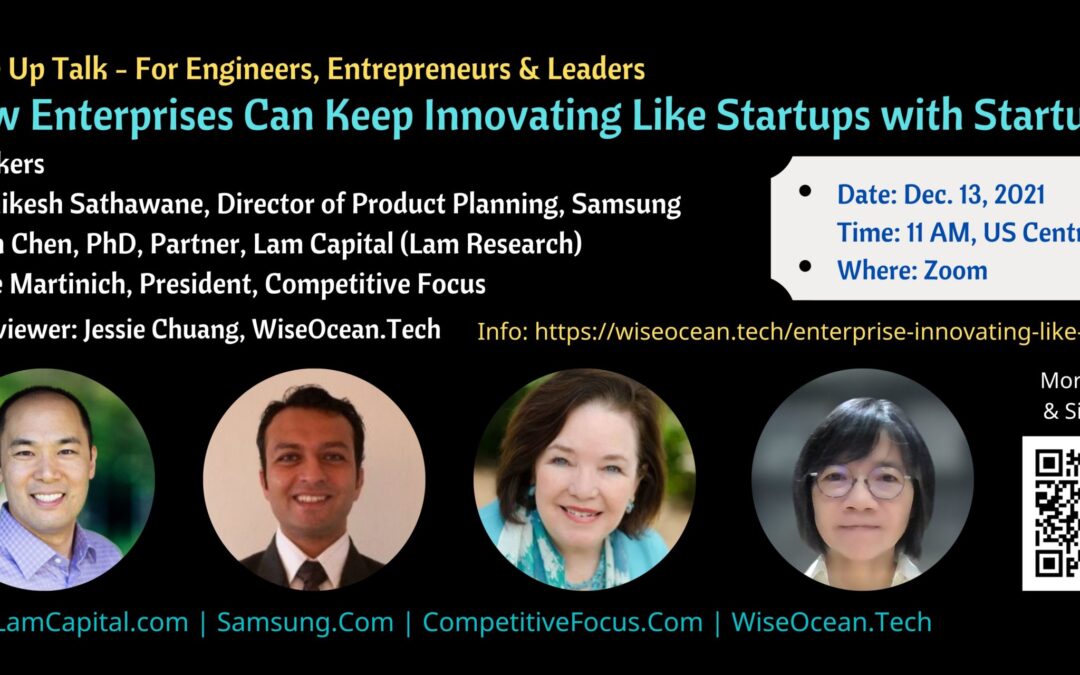
by WiseOcean | Dec 7, 2021 | Open Innovation, Scale Up
This is an interesting point in history as Moore’s Law is coming to an end. Pursuing device dimension downsizing doesn’t work as well as before, innovations in materials, IC integration and packaging, technology stack, system and architecture level, also business processes and business models are all important and fast-moving. Collaboration across old boundaries is not just a nice-to-have. Furthermore, the big environmental impact caused by the semiconductor industry can’t be neglected, answering to sustainability calls is another challenge to the semiconductor industry. How can collaboration across segmentations in the value chain help with a greener future? What’s possible and what’s not?
As usual, we connect conversations from across boundaries, in this roundtable, we’ll have authentic perspectives from a big enterprise leadership (Samsung), a deep tech venture capitalist (Lam Research/Capital), and an experienced expert on engineer’s leadership development (with UT Austin). It’s a closed-door brain date, no streaming, sign up to join us.
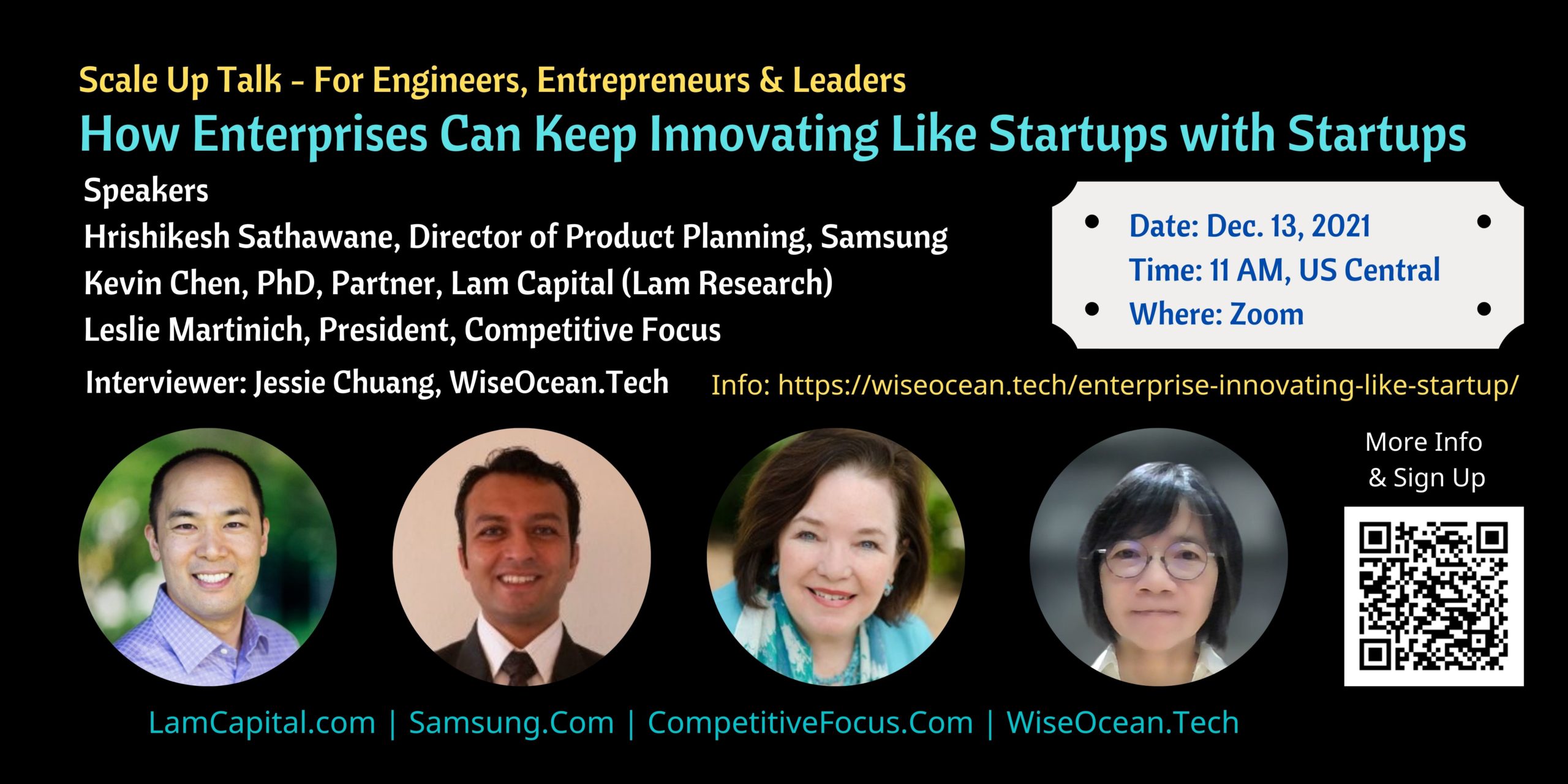
When/Where
Date: Dec. 13, 2021
Time: 5 PM, GMT / 11 AM, US Central Time
Where: Zoom (The meeting link will be sent to you)
Interview questions
(For Samsung’s background information)
Samsung is a huge multinational enterprise with capabilities from semiconductor foundry, memories, to IC design to consumer electronics. Could you help us understand the organizational structure and collaboration of the whole Samsung innovation ecosystem? (venture capitals, innovation department, new product planning department, etc)
What is Samsung’s strategy for engaging with startups across different possibilities? (how do you scout, relationship before investing, early-stage investing, integration with business units, M&A…) And which business lines are working with startups? (Semiconductor, consumer electronics, sofrware & services…)
(For Lam Capital’s background information)
Lam Research is a long-standing leader in semiconductor equipment manufacturing, while Lam Capital is a young subsidiary of Lam research. What is the main strategic consideration when it comes to establishing an investment arm?
What is Lam Research/Capital’s strategy for engaging with startups across different possibilities? (how do you scout, relationship before investing, early-stage investing, integration with business units, M&A…) How does Lam Capital collaborate with startups and your parent company?
(For Samsung and Lam Capital)
How do you measure the success of startup engagement? What is its value that can’t be quantified?
Can you tell us some lessons about startup engagement you have learned? And some success stories?
What are you looking for in startups that want to work with you?
- stage
- product or technology category
- geography
- Attributes of founders or teams …
(For all speakers)
Most startups you engage with might be deep tech teams. What are your suggestions for engineer founders? (or stories of how engineers succeed in startup ventures)
What are the different challenges faced by scaleups compared with startups, and do you have any advice for them?
What is great leadership look like when it comes to leading deep tech enterprises to continue to innovate at a meaningful scale and speed?
What environment and education can create the most innovative engineers in deep tech?
(Add your questions)
Speakers
Hrishikesh Sathawane, Director of Product Planning at Samsung
Hrishi has his MS in Electrical Engineering with a focus on Semiconductors and Solar Cells, and MBA with a focus on Marketing/Strategy and Clean Technology. has had leadership positions in big companies – 10 years in Micron Technology, 6 years in Toshiba, 3 years in Western Digital, and currently the Director of Product Planning at Samsung. His strengths include product marketing (coordinate sales, customers, engineering and management to launch new products and opportunities), and strategic marketing (investigate big trends in technology and markets and relate them to the company’s product offering, conceptualize new products based on market direction and ensure company’s involvement in industry groups). He has a deep understanding in the market for electric vehicles, battery, Flash memory modules markets, Utilities and related regulations, among others.
Kevin Chen, Partner at Lam Capital
Kevin joined Lam Capital mid-2020 bringing over 15 years of entrepreneurial and operating experience in materials-centric deep- and bio-tech companies. Most recently, Kevin was CEO of Crop Enhancement, an agriculture technology company commercializing novel products that replace synthetic pesticides, leading it from Seed through Series B. Prior to that, Kevin held senior roles at Hanergy (EVP of Silicon Valley Product Development Group) and Applied Materials (CMO of Energy and Environmental Solutions and GM of Energy Storage Solutions). Prior to Applied, Kevin led business development and product management efforts at NanoGram (acquired), AMD/Spansion, and Lumentum. Kevin’s passion for entrepreneurship was ignited early in his career when he co-founded Cumulus Photonics to commercialize innovative optical networking equipment. He earned his Ph.D. from MIT and is a mentor with the MIT VMS.
Leslie Martinich, President, Competitive Focus
Leslie holds a Master Degree in Computer Sciences from the University of Texas at Austin. She is a regular speaker at global and corporate events, inspiring technology and engineering professionals to improve innovation capabilities. In her many years in the tech industry, she observed that engineers and leaders need to build skills in innovation management, leadership, critical thinking, communication strategies, negotiation, ethics, diversity and inclusion, and more. Knowing that engineering professionals prefer to receive that training from someone who understands their industry, she has been teaching those topics to engineers, entrepreneurs, and leaders since 2001. She has also chaired several operating units in IEEE, including the IEEE Central Texas Section.
Moderator
Jessie Chuang, Wise Ocean
With a background in Physics and Electrical/Electronics Engineering, Semiconductor Industry R&D, and consultancy experience with corporations on cost reduction, product development, and project management of emerging technologies and AI, Jessie has been passionate about building interdisciplinary knowledge networks for big challenges and open innovations. She co-founds Wise Ocean with a team across borders to help scaleups build up the growth journey through global strategic partnerships, also to coordinate collaboration between startups/scaleups, strategic investors, ecosystem partners, and enterprises. Jessie helps with industry connections opportunities in the IEEE society as a community service.
Ecosystem Partners
StartupBlink
StartupBlink is the world’s most comprehensive startup ecosystem map and research center, working to uncover the momentum of startup ecosystems globally and to accelerate their growth. We combine our technology with consulting and research, to offer startup ecosystem developers all the support they need in order to succeed.
Mawsonia
Mawsonia Ltd is the publisher of three titles: Global Corporate Venturing, Global University Venturing, Global Government Venturing. These are accompanied by events and networking opportunities across the world. Our target community is the world of corporate, university, and government venturing. There are about 1,000 companies worldwide with corporate venturing departments. These departments back and incubate exciting new companies. Alongside these investors are universities developing new spin-outs and governments seeking to create a framework to encourage enterprise and ingenuity. Mawsonia is the publishing and events company that operates at the heart of this community.
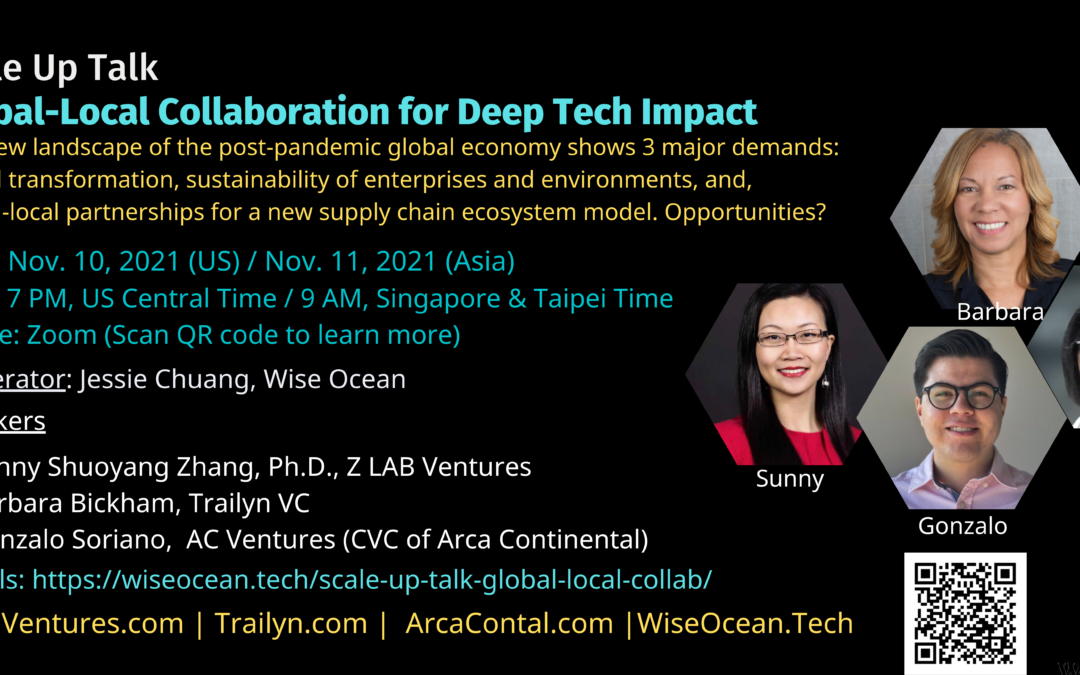
by WiseOcean | Nov 2, 2021 | Scale Up
The new landscape of the post-pandemic global economy shows three major demands that we need to pay attention to – digital transformation, sustainability of enterprises and environments, global-local partnerships for a new supply chain ecosystem model.
Tough human challenges such as climate change/net-zero, energy transition, public health crisis, workforce transformation, cybersecurity, need Deep Tech advancements. Ideally, Deep Tech should be applicable globally with localized partnerships and innovations, when it’s done right, local entrepreneurs could create value faster and benefit from global collaboration. But cross-boundary communication and relationship building is much needed for that ideal!
Four Capitals to Grow A Company Globally
There are at least four capitals to build and grow a company from zero, or to enter a new market for scaling up global market share — Intellectual Capital, Human Capital, Social Capital, Financial Capital(quoted Sunny Shuoyang Zhang, Ph.D., Z Lab). It takes a village, with different resources, to grow a company, this is especially true for Deep Tech. Technical teams need commercialization expertise, domain market understanding/strategy, and local relationship to build product-market fit and business success. Fortunately, remote collaboration and digitalization leveled up by COVID-19 might open new possibilities for us.
We will be hosting a roundtable with experienced speakers to share their stories in growing and scaling up innovations and Deep Tech startups.
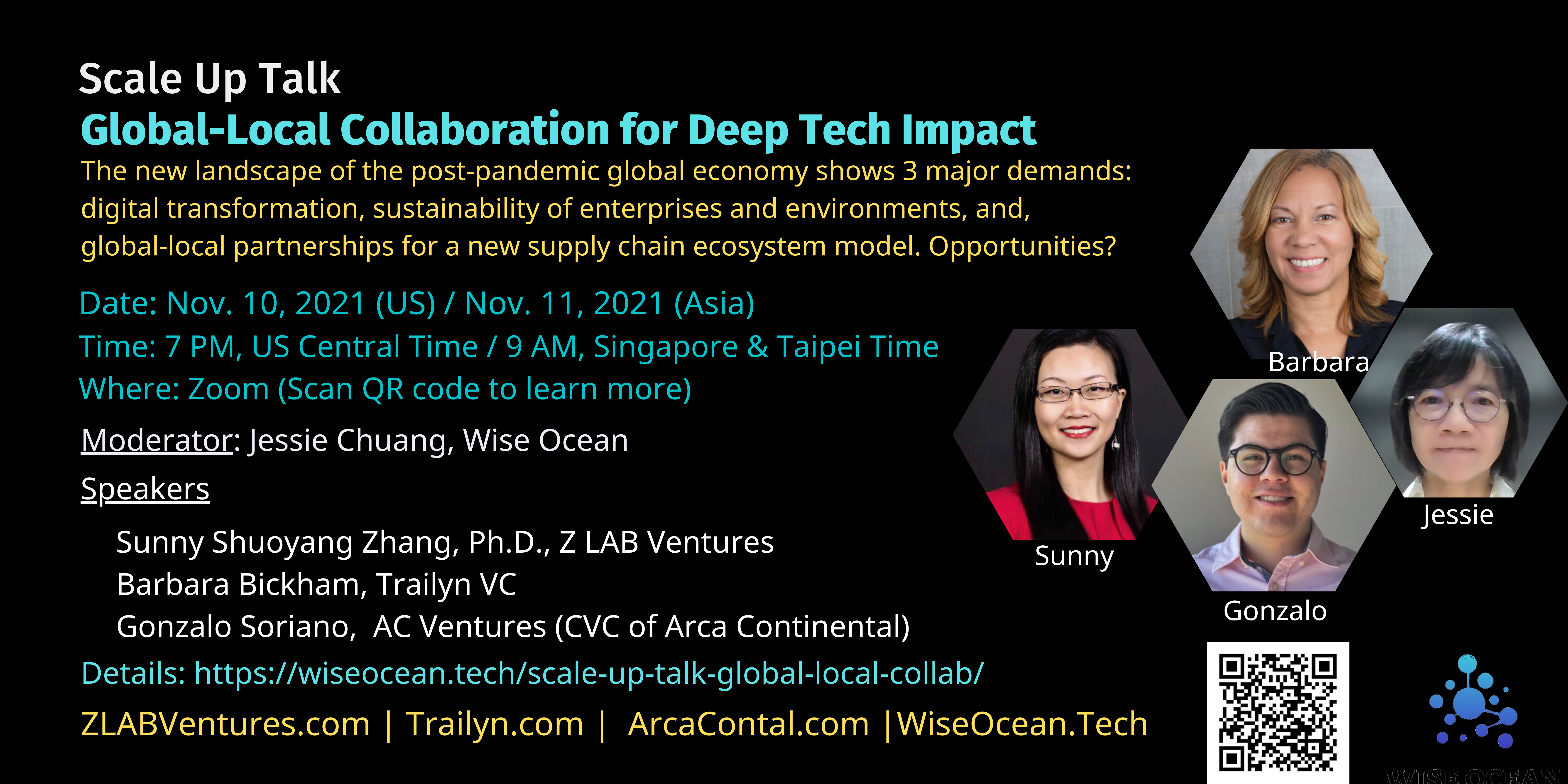
Interview questions:
What are those opportunities, in terms of ventures as well as how people work, emerging from a digital new world pushed forward by COVID-19?
What are the best opportunities for Blockchain and AI startups now? What kind of startups are most interesting to you now?
How do you evaluate and select early AI/Blockchain companies to work with?
What will you bring to your portfolio companies beyond financial capital to help them grow? Success stories will be interesting!
What trends do you see in globalization and localization of innovations from startups or enterprises?
What advice will you give to Deep Tech scaleups entering a new market? How can we support them?
How can startups with less capital(s) compete with bigger players in a target market? Why do you choose to support untapped or underestimated founders?
What’s the potential of Blockchain or AI being leveraged by under-resourced scaleups to grow globally?
Speaker: Sunny Shuoyang Zhang, Ph.D., Z LAB Ventures
Dr. Sunny Zhang has been focused on the intersection of technology, people, and business for over 20 years, specializing in innovation adoption, digital marketing, social networks, and international business as a researcher, educator, and venture builder. She is a tenured marketing professor at the University of St. Thomas and the founding partner of Z LAB Ventures, a startup studio, and fund building and investing in impact-driven software startups from a scratch through a rigorous and repeatable process with minimized risk and maximized capital efficiency to address UN SDGs.
About Z Lab
Z LAB is a venture studio partnering with the world’s leading innovators to build and invest in impact-driven software startups. Combining intellectual capital, human capital, financial capital, and social capital, it’s a startup studio and fund building and investing in impact-driven software startups from a scratch through a rigorous and repeatable process with minimized risk and maximized capital efficiency to address UN SDGs.
Speaker: Barbara Bickham, Trailyn VC
Barbara is passionate about Deep Tech and international collaboration. She is CTO for multiple tech start-ups around the world, provides strategic advice and technical execution for companies incorporating Blockchain and/or Artificial Intelligence into their company and products. She works with CEOs, Accelerators, Incubators, and Boards on Technology Strategy, Business Strategy, Fundraising, Blockchain Token Economics, Blockchain Technology Strategy, and Architecture. Barbara is also a speaker on Blockchain Technology and Blockchain Funding Trends.
About Trailyn VC
Trailyn VC is a pre-seed Deep Tech Fund based in Los Angeles, California empowering the untapped and diverse deep-tech founders. It offers a virtual accelerator teaching the 8 week “Due Diligence and Sustainability Intensive”, mentors startups globally.
Speaker: Gonzalo Soriano, AC Ventures
Gonzalo Soriano is a senior investment analyst at AC Ventures, a corporate venturing vehicle sponsored by Mexico-headquartered Coca Cola bottler and distributor Arca Continental. He supports the investment process and portfolio management activities and is also in charge of research and entry strategy into new ecosystems.
About AC Ventures
AC Ventures is a CVC sponsored by Arca Continental, the third largest Coca-Cola bottler in the world with operations in the US, Mexico, Peru, Ecuador, and Argentina. Additionally, AC also commercializes Snacks in the US, Mexico, and Ecuador. The CVC arm invests directly in global high tech startups in sectors such as Industry 4.0, Retail, Embedded Fintech, Snacks and healthy food; and value chain for water and plastics. In addition, they act as LP in global VC funds.
Moderator: Jessie Chuang, Wise Ocean
With a background in Science and Engineering, Semiconductor Industry R&D, and consultancy experience with corporations on technologies and AI, Jessie has been dedicated to building interdisciplinary knowledge networks for big challenges and open innovations. She co-founds Wise Ocean with a team cross borders to help scaleups build up the growth journey through strategic partnerships.
About Wise Ocean
Wise Ocean offers US/Asia Launchpad program for Deep Tech companies. We curate and organize global and local resources and partners, align motivations, to offer structured help for scaleups entering/growing in the US and Asia areas. We help with navigation and evaluation of market resources and options, connect companies with the right people as needed. Learn more about US/Asia Launchpad program.
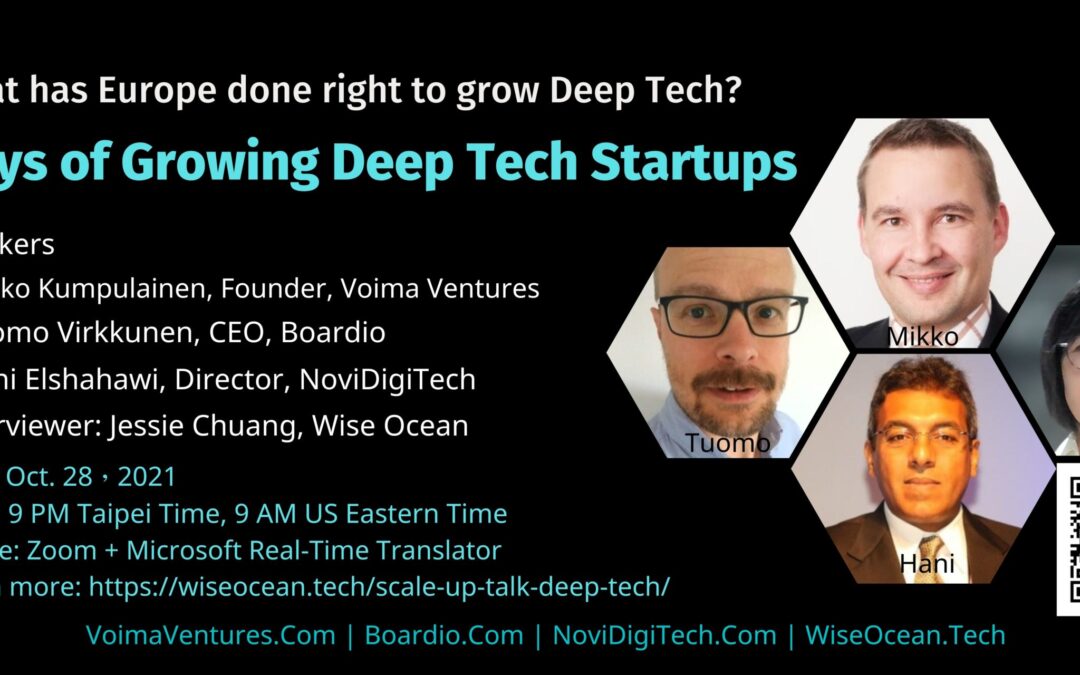
by WiseOcean | Oct 5, 2021 | Scale Up
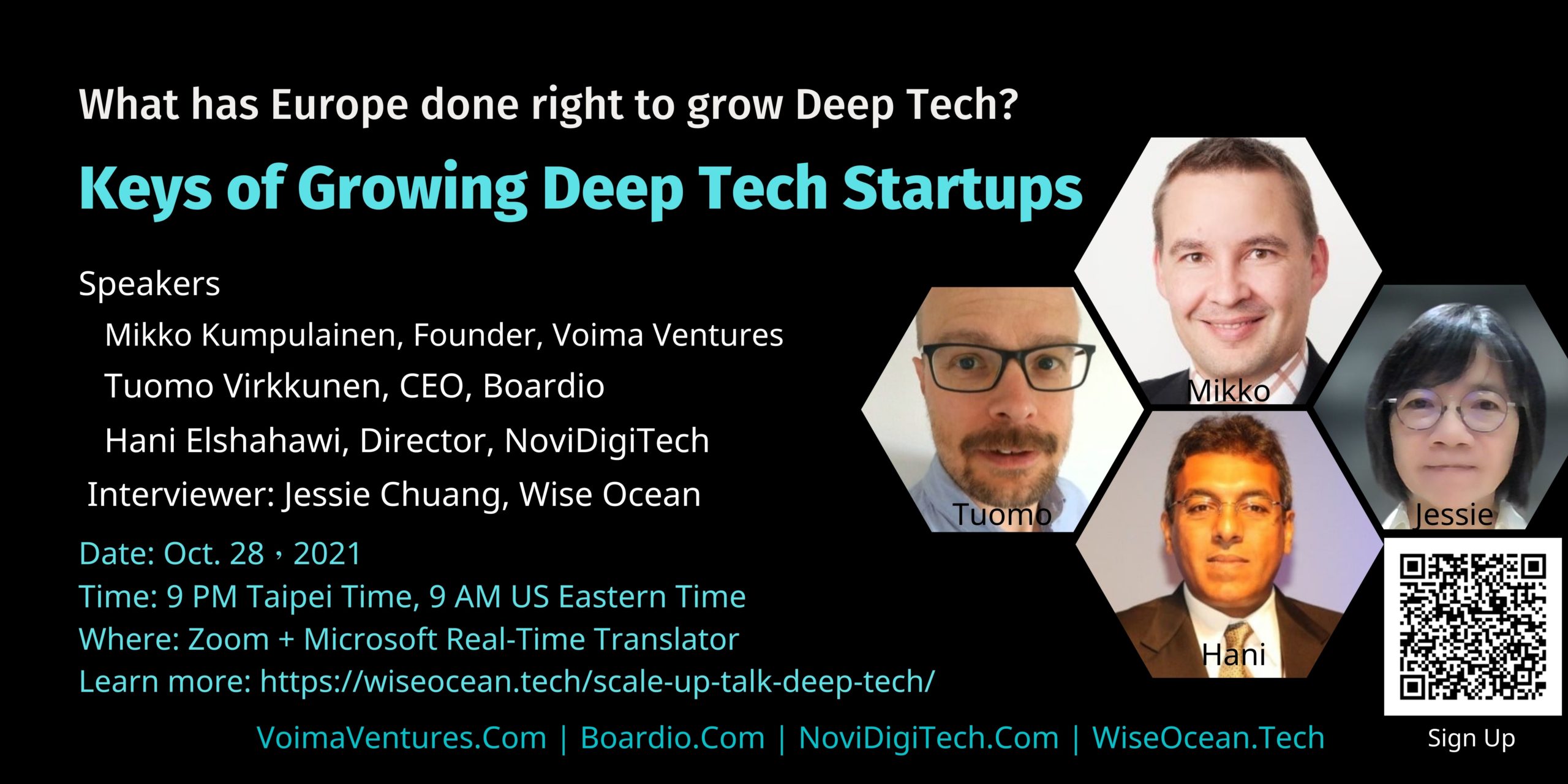
Scale Up Talk: Keys of Growing Deep Tech Startups
Date: Oct. 28,2021
Time: 9 PM Taipei Time, 9 AM US Eastern Time
Where: Zoom + Microsoft Real-Time Translator
Group: LinkedIn Event Group
Deep Tech Investment Accelerates
The EU is heavily investing in strengthening Europe’s deep tech, according to a report created by Dealroom and Sifted, and supported by the European Commission and European Parliament, European deep tech companies are now worth a combined €700B, including Artificial Intelligence, blockchain, robotics, quantum technology, and more commercialization of deep Science R&D, now accounts for a quarter of all venture capital investment in Europe.
The report gives a definition for deep tech…
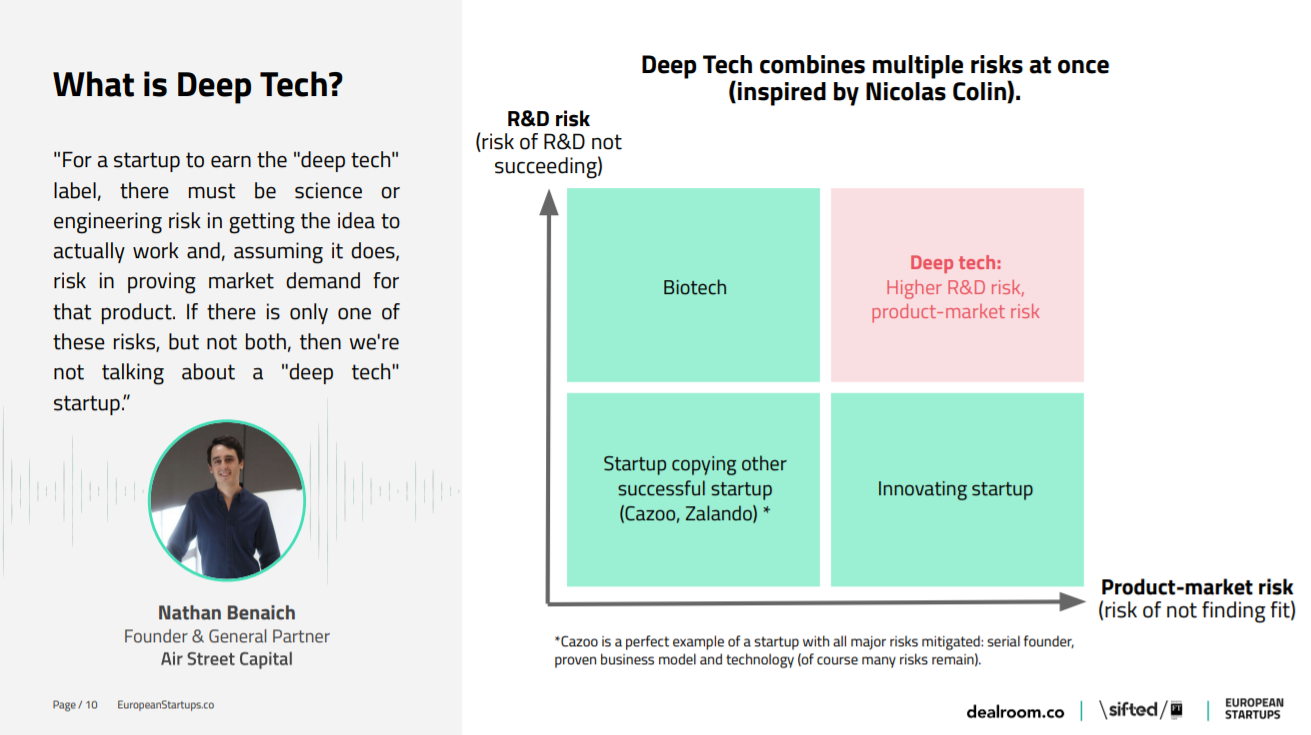
Many of Europe’s top deep tech companies have their roots in academia and drew early support from government grants. Different stakeholders play different roles throughout the lifecycle of a deep tech company.
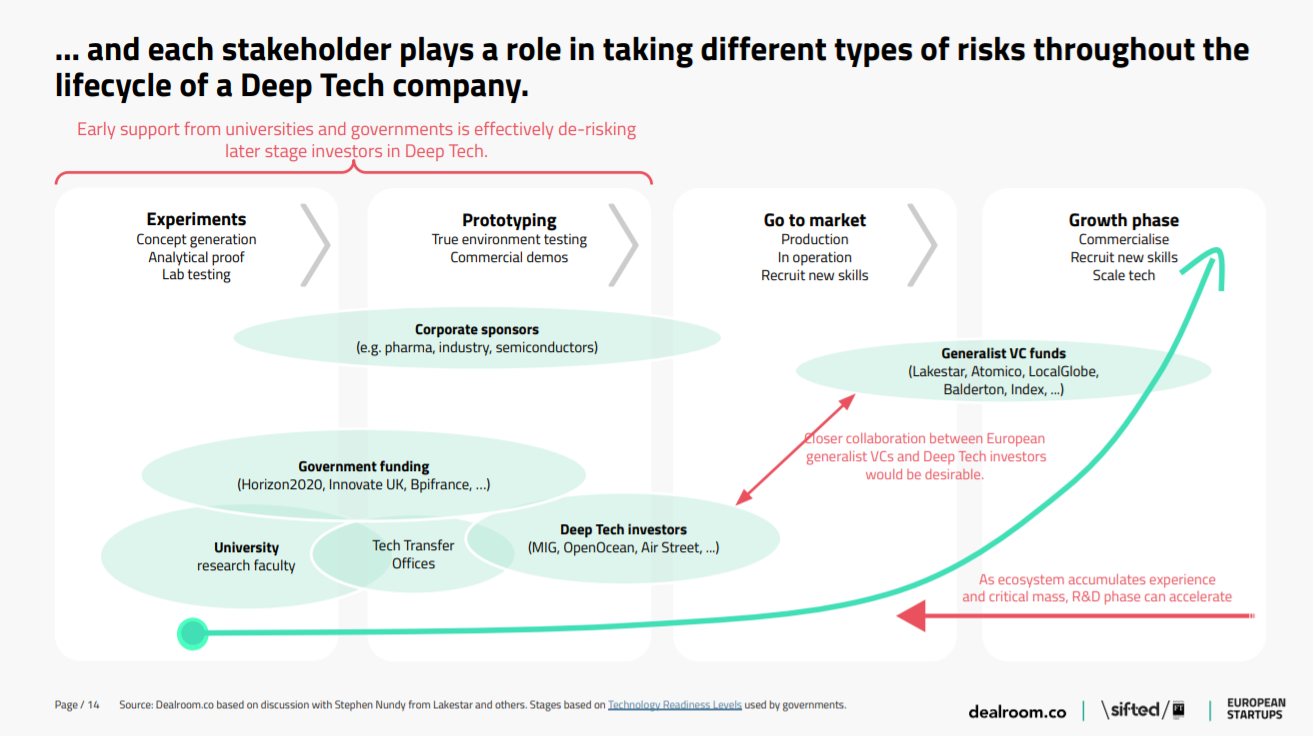
Deep tech startups are having broader and deeper impacts in diversified domains recently. We are thrilled to host speakers from Europe and the US to share their experience in deep tech startups growth!
Speaker: Mikko Kumpulainen, Voima Ventures
Mikko Kumpulainen is a co-founder and partner at Voima Ventures, a deep tech early-stage venture capital investor in the Nordics. Mikko has over 17 years of experience in venture capital and private equity investments in the Nordics. He has also worked as a consultant at the Boston Consulting Group.
About Voima Ventures
Voima Ventures has over 65M€ under management and approximately 30 deep tech companies in its portfolio. Voima Ventures focuses on seed-stage investments into Nordic science-based startups and spin-off companies coming from academic research organizations. We combine science-driven innovation together with the Nordic serial entrepreneurial experience and a global mindset.
Speaker: Tuomo Virkkunen, Boardio
Tuomo is the founder and CEO of Boardio which is a matching service for companies and advisors. Before Boardio Tuomo worked for Nokia where he headed several early phase innovation projects. He will share the strategy of leveraging board members from a global network and success stories.
About Boardio
Boardio is a global platform that finds advisors and board members for companies. There are over 3500 advisors from 100 countries on Boardio. These people are willing to help companies grow, develop their business, enter new markets, or whatever needs the company may have. Boardio offers a Turnkey service with a success fee to find advisors with suitable backgrounds and interests to work with the company.
Speaker: Hani Elshahawi, NoviDigiTech
With more than three decades of experience (18 years in Shell) in operations, innovation, technology management, business consulting, and the full cycle of innovation from cradle to grave and from concept to commercialization, he is currently the managing director of NoviDigiTech. He will share his experience in Shell and its GameChanger program — how a leading energy company engages with deep tech startups, builds game-changing success, and his future endeavor.
About NoviDigiTech
NoviDigiTech LLC (NoviDigiTech.com) is about Helping People & Powering Progress through Innovation, Digital Enablement, and Technical Excellence. We do that by partnering with innovators, academics, startups, entrepreneurs, investors, and customers to create impact and drive growth through integration, collaboration, digitalization, and education.
Moderator: Jessie Chuang, Wise Ocean
With a background in Science and Engineering, Semiconductor Industry R&D, and consultancy experience with corporations on learning technologies and AI, Jessie believes that innovations flourish from the collaboration between parties in different domains, and has been dedicated to building interdisciplinary knowledge networks for big challenges, digital transformation, and open innovations. She co-founds Wise Ocean to help scale-ups and build up the growth journey to scale up impact through strategic partnerships across boundaries.
Interview questions might include:
How do you evaluate the IP or core technology of deep tech startups in diversified fields?
How do deep tech startups overcome the risk of product-market fit along the growth journey?
Deep tech startups need much more than IP to succeed, do you have a framework for supporting them?
Comparing EU and other countries, what EU has done right to grow deep tech startups by the governments and enterprises?
When deep tech startups enter a new market, what resources are needed to grow? What is your advice for them?
What are the deep tech innovation domains most exciting to you in the next 5 years? (Or you’re most interested to invest/involve in)
Note:
What are the key elements of deep tech startups’ success at a higher level? Growth entrepreneurship, science-driven innovation, value-adding capital. More specifically, what are the key elements of human capital that are the foundation of everything? That might include recruiting strategy, growth culture, diversity in the board, and ecosystem partners.
Some startups in Voima Ventures’ portfolio:
Leveraging space technology(nanosatellites), novel hyperspectral technology, Earth observation imagery datasets, and AI methods, a startup helps farmers as well as bio asset owners, businesses and governments get better insight for making decisions towards precision farming, carbon binding and reduction of climate effects.
Commercialization of 25+ years of continuous innovation in energy storage, a startup provides high-power heavy-duty energy storage solutions based on proprietary water-based electrolyte and Engineering know-how. Their slogan is “Powered by pure water”.
Disrupting the light-sensing component market by providing a universal photodiode for all applications, a startup utilizes advanced nanotechnology & atomic layer deposition techniques (Black Silicon) to produce light- and X-Ray detectors with superior sensitivity, accuracy, efficacy, and match with the design.
Another startup cures severe corneal blindness with an off-the-shelf stem cell therapy, it is developing new cell therapy products for the treatment of blindness.
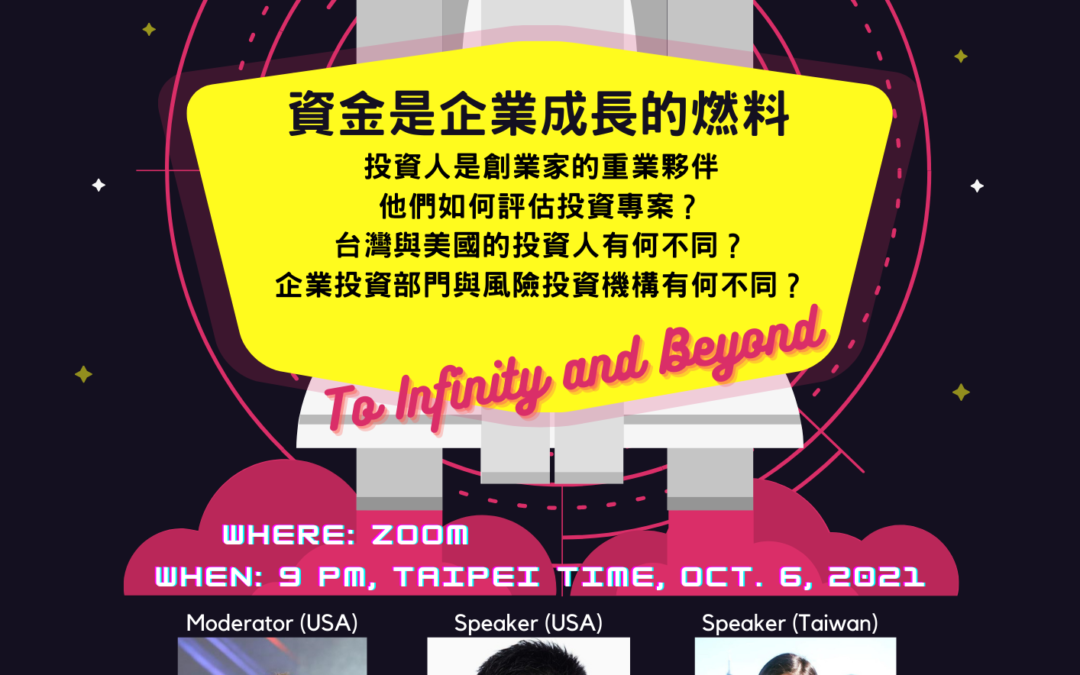
by WiseOcean | Aug 27, 2021 | Scale Up
疫情催生了美國超低利率環境,獲利的壓力把破記錄的資金推擠到風險投資上,2021 年全球創投 (VC) 業募資創下空前歷史新高,僅上半年就已接近去年全年總金額,這表示對創投募資變得容易了嗎?過去一年多在歐美以 SPAC (特殊目的性收購公司,像借殼掛牌上市) 上市的公司數與總市值更是寫下空前紀錄,新創公司取得資金的機會從沒如此豐沛過!但同時也讓競爭輪動加速。如果技術或産品一樣强的公司,有充沛資金與否將成爲輸贏關鍵嗎?
同時因爲科技的顛覆性創新,除了傳統的創投之外,許多其它的資金來源出現了,創新的創投以新的方法與工具,挑戰傳統創投(降低成本,提高專業度),企業創投在專業服務 (Venture-as-a-Service) 的協助下,五年大約成長了五倍,超級天使投資人影響力增大也更專業,還有創新的平臺以新的商模彙集投資人,在 IPO 之外提供巨額資金管道。在投資的周期與價值鏈中:Fundraising, Deal Flow Building, Selection, Negotiation, Due Diligence, Supporting, Exiting,許多環節也被科技顛覆中,包括自動化流程,與採用 AI ,以提升競爭力,也就是創投業本身也正在被顛覆中,這些變化對尋求財務、策略投資合夥人的公司有何影響?
臺灣公司沒條件只看國內市場,遠距工作好像也打開了機會之窗,但不懂國際市場遊戲潜規則與趨勢,國際競爭力堪慮。
Wise Ocean (WiseOcean.Tech) 是美國的創新顧問公司,本系列活動目的在藉由新創生態圈朋友的第一手觀察,協助台灣公司了解台灣與美國的投資者與市場趨勢,增加未來的成長、合作機會,鼓勵台灣公司放眼國際市場。未來將直接邀請歐美新創/創新/投資界人士來進行互動(以後英文進行,本場用中文,報名請掃 QR Code)。
將你想問講者的問題陳述在這裏。或来信:Contact[at]WiseOcean[dot]Tech
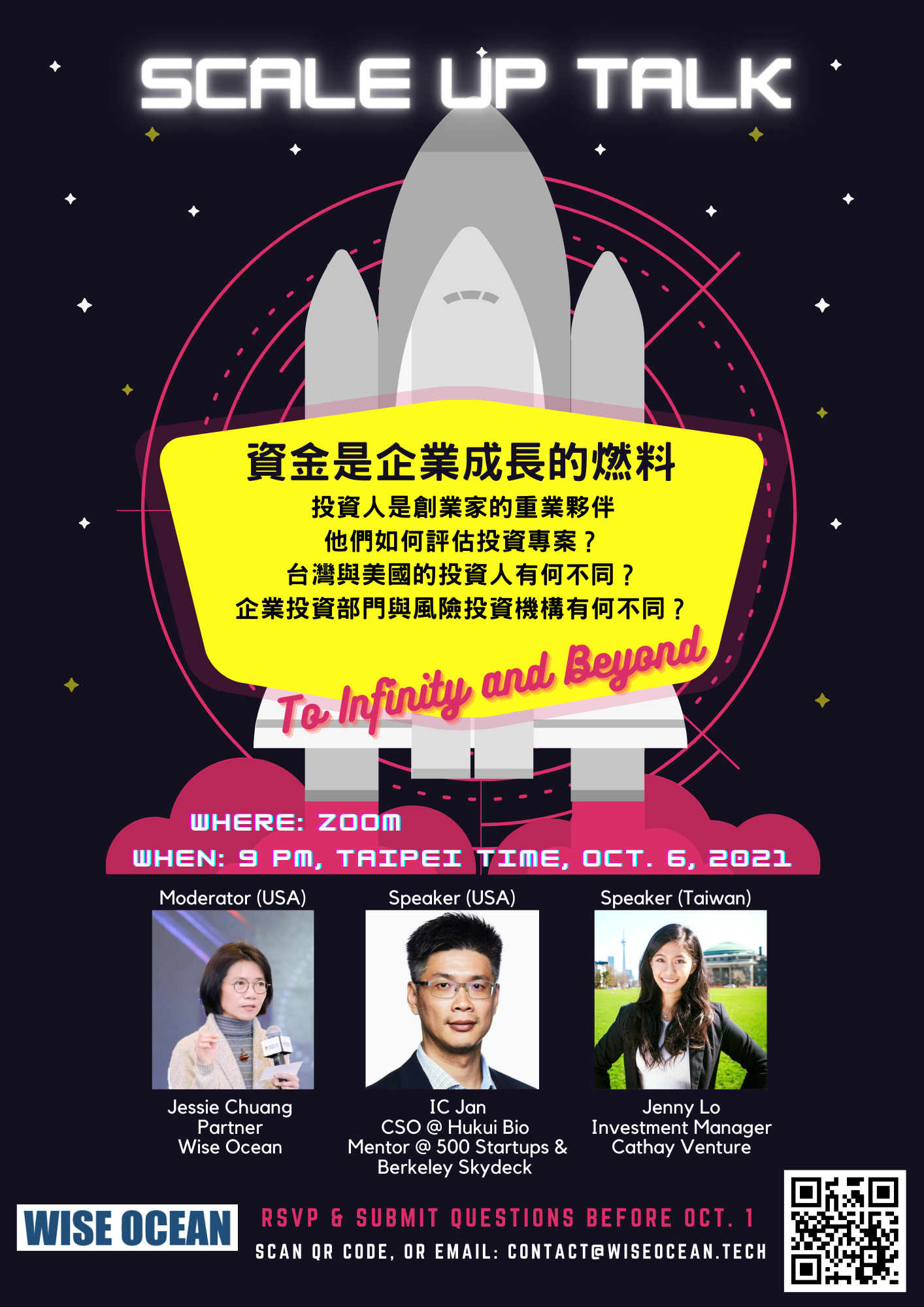
Brain Dates with US Partners – 尋找台灣 A-Teams!
- 有客戶,具有經過驗證的產品或技術;
- 公司對於與推展美國市場或合作(開發國外需求之產品/服務/市場)有興趣,有專責負責人;
- 不限新創,不需在國外有辦公室與員工,可以拉策略伙伴一起行動。
我們根據產業別、技術領域、主題、落地經營需求,從美國創新生態網絡(同業互補之公司、創投、企業創投、天使投資平台、加速器、Listing 輔導、Venture Studios、人才招聘服務)等進行配對與邀請,進行小組會議,幫助溝通共創,以達成策略性結盟、Joint Ventures 為目的。
聯繫: Contact[at]WiseOcean[dot]Tech
Next talk: Scale Up Talk – Four Capitals to Grow A Company









